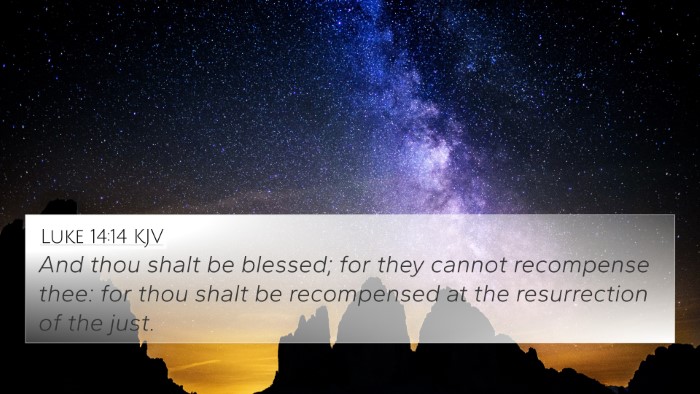Ephesians 6:8 states, “Knowing that whatever good anyone does, he will receive the same from the Lord, whether he is a slave or free.” This verse encapsulates profound theological and practical insights into the character of God and the implications of our actions. Here, we delve into the meaning, connections, and interpretations drawn from public domain commentaries by Matthew Henry, Albert Barnes, and Adam Clarke.
Verse Meaning
This verse emphasizes the principle of divine justice and reward. It assures readers that God acknowledges every good deed, irrespective of social status, which is particularly relevant in the context of the ancient world where slavery was common. It highlights that God's eyes are on all people, and He rewards a good heart and actions without regard to one’s earthly position.
Insights from Commentaries
- Matthew Henry: Henry highlights that this verse reassures believers about the equity of divine reward. He notes that God sees the service we render to others, which aligns with His justice—those who do good shall not go unrewarded. The emphasis on "slave or free" serves to level the playing field, emphasizing that everyone is valued in the eyes of God.
- Albert Barnes: Barnes elaborates on the promise of receiving good from the Lord, linking it to the accountability that each individual holds. According to Barnes, the good done in faith, whether recognized by the world or not, ultimately finds a response from God. This reinforces the theme of God’s impartiality and fairness.
- Adam Clarke: Clarke interprets the verse within the larger context of Christian principles of service. He underscores that the reality of divine reward serves as a motivation for righteous living. Clarke also emphasizes the transformative nature of service, positing that serving in faith not only blesses the recipient but also glorifies God.
Connections Between Bible Verses
Ephesians 6:8 connects with various other scriptures, reinforcing its themes of divine justice, the nature of Christian duty, and the egalitarian nature of God's kingdom.
- Colossians 3:23-24: “And whatever you do, do it heartily, as to the Lord and not to men, knowing that from the Lord you will receive the reward of the inheritance; for you serve the Lord Christ.” This reinforces the notion of working for God’s recognition rather than human approval.
- Galatians 6:7: “Do not be deceived, God is not mocked; for whatever a man sows, that he will also reap.” This ties directly into the reward theme, stressing that our deeds align with consequences.
- Matthew 25:40: “And the King will answer and say to them, ‘Assuredly, I say to you, inasmuch as you did it to one of the least of these My brethren, you did it to Me.’” Here, Christ emphasizes that acts of kindness to others are seen as acts towards Him, showcasing the divine view of service.
- James 1:12: “Blessed is the man who endures temptation; for when he has been approved, he will receive the crown of life which the Lord has promised to those who love Him.” This verse echoes the themes of trials, perseverance, and divine reward.
- 1 Peter 1:17: “And if you call on the Father, who without partiality judges according to each one’s work, conduct yourselves throughout the time of your stay here in fear.” This reinforces God’s impartial judgment based on actions.
- Romans 2:6-8: “He will repay each person according to what they have done: to those who by perseverance in doing good seek glory, honor, and immortality, he will give eternal life; but for those who are self-seeking and who reject the truth and follow evil, there will be wrath and anger.” This passage emphasizes accountability and the nature of God’s judgment.
- Hebrews 6:10: “For God is not unjust to forget your work and labor of love which you have shown toward His name, in that you have ministered to the saints and do minister.” This serves as an assurance of God’s recognition of service rendered for His sake.
Thematic Connections
The themes seen in Ephesians 6:8 are prevalent throughout scripture, promoting a culture of diligence, responsibility, and awareness of God in every act of life. Here are some significant thematic connections:
- Service and Reward: Throughout the New Testament, believers are encouraged to view their service as ultimately for God, thereby linking their daily actions back to divine purpose.
- Equality under God: The removal of barriers of slave and free in God’s sight promotes unity and equity within the body of Christ, a theme echoed throughout Pauline letters.
- God’s Justice: Many scriptures emphasize that God does not show favoritism, underscoring the universality of His principles of justice.
Understanding the Lord's Reward
Understanding that the Lord rewards good done can provide deep encouragement to those who may feel unnoticed or undervalued in their service to others. The promise of divine reward cultivates an environment where believers can find strength in the knowledge that their labors are seen by God.
Conclusion
In conclusion, Ephesians 6:8 presents a biblically rich principle that emphasizes God's awareness of good works, the promise of rewards, and the dismantling of human hierarchies in the scope of divine grace. Through understanding this verse and its connections, we can grasp the broader biblical narrative that calls believers to serve faithfully, knowing their efforts are not in vain.
Tools for Bible Cross-Referencing
For those interested in exploring related scriptures and their connections further, several tools may assist:
- Bible concordance
- Bible cross-reference guide
- Cross-reference Bible study
- Bible reference resources
- Comprehensive Bible cross-reference materials



















